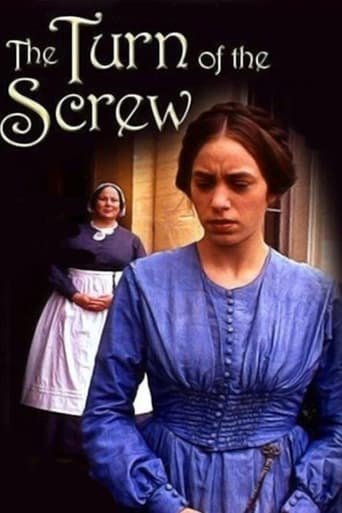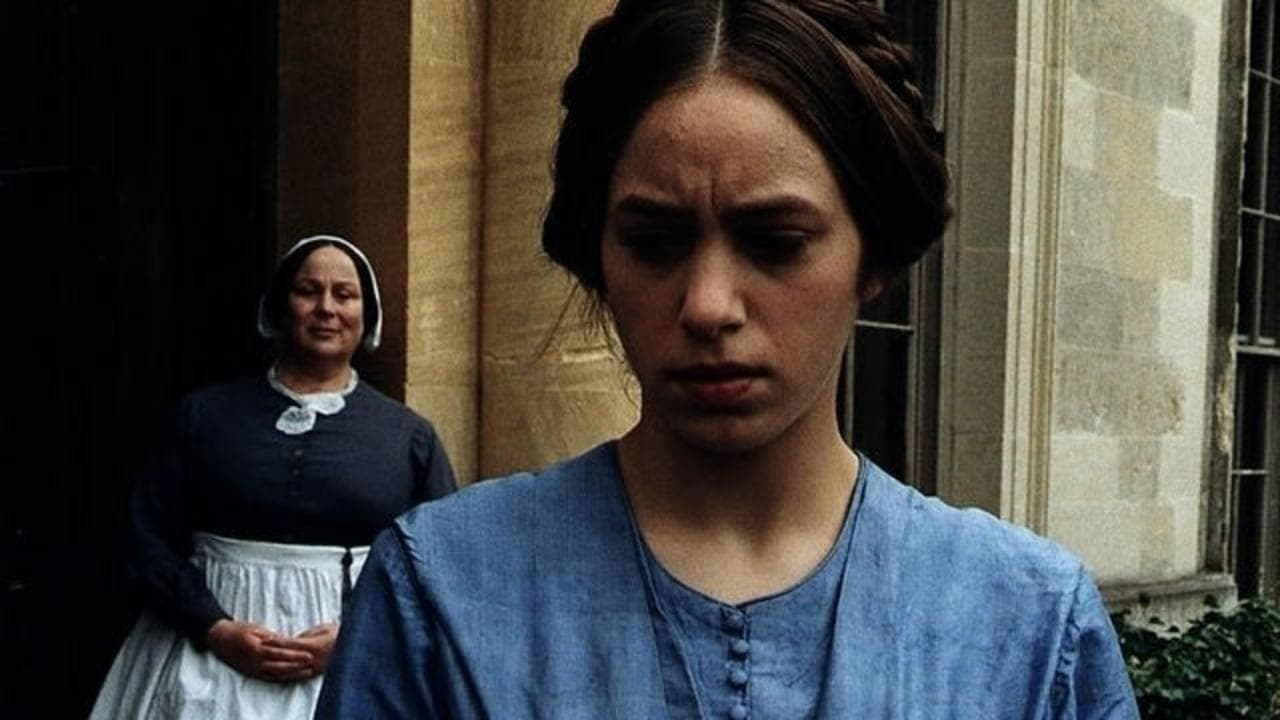Dr Jacques COULARDEAU
This adaptation is very faithful indeed with the characters, the setting, the various moments of the story, apparitions of the ghosts included. The film is also clear about the parents of the kids, the mother died of yellow fever, we assume in India, and the father died on duty in India too one year late. But the film, like Henry James' novella, does not capture the tremendous trauma the children must have gone through and then – the film is clear about that – Miss Jessel got pregnant which made her have to go, to be let go by the Master. Pregnant from whom? The situation implies from Peter Quint. But the first double trauma of the children is now amplified by a second double trauma with Mis Jessel going away and dying, by suicide as the opening scene shows, closely followed by Peter Quint dying in some kind of accident, fake or not does not matter. And strangely enough only the nameless governess is traumatized by these facts and she is led into seeing ghosts that no one else sees.The film insists on this aspect of the character. She is getting little by little haunted – but in her sole mind – by her two predecessors. The kids are at an age – and their having gone through these two double traumas helps – when they can capture the fears of adults and they can get motivated to play on these fears, for fun or in this case for liberation.The governess becomes a power and control freak and she transforms teaching into taming wild animals if not beasts. She sees them perverted while she is the one who is perverted. The film is discreet on this side of things though Henry James insisted on the governess's hugging, kissing, holding hands, embracing, etc., with Miles particularly. She was obviously falling in love with Miles and wanted to possess him so strongly that he would became part of her own self. She was cannibalistic in her unjustified love for Miles. To love a child is a lot more challenging than to love an adult because the child cannot answer, cannot say no, cannot run away and when Miles tries the governess does not understand. The film insists on that but not on the sentimental, emotional and physical love of the governess towards Miles that is definitely desire and this desire is somewhere felt as wrong, evil is her word, so she has to repress it and the ghosts are her tools to transfer her repressive desire against her perverse impulse onto the object of this pedophile lust, hence onto Miles, and accidentally Flora.She literally tortures the kids with the ghosts, till the very end, though Benjamin Britten does a far better job with that last scene about being alone and how the governess is understanding the ambiguity of the situation on which Miles is playing full blast, and it works. That's what the two kids show us in the film very clearly: they are playing with the governess like two cats and one mouse. She falls in the trap every single time and she ends up being a fool. But that fool is criminal.The film here centers this last scene on the last breath of Miles. He is more or less dragged by the governess into her arms and into an embrace and here the films innovates because the call for "Quint, you devil, Where are you, where are you?" is a call for help when Miles sees his end is close, the praying manta has captured him. But Quint won't be able to come because he is no where, near or far, he is no longer one of them. And the film is clear when it shows the governess embraces Miles to death, till death parts him from his life, and Miles is just plainly choked to death. No ambiguity, no fuzziness. She is a criminal and she was brought there by the size of the responsibility she was entrusted with and she could not cope with and up to. Well done, well directed, well performed, the film is impressive, though in no way frightening. We are horrified by the governess's fall into crime because of her repressed and unaccepted feelings and desires for a boy under her own educational responsibility. She is depicted as a closet pedophile who ends up killing the child she wants to possess, including physically. I am afraid though this takes a lot of mystery from the story without modernizing the vision. Such facts are rare in the concerned world of education, and in fact I just wonder if they are in proportion more important in this world than in the wide society around.Note there is a mistake on the back sleeve of the DVD: the children are not those of the "charming bachelor" because he is only the guardian and they are his nephew and niece. But, well, a child is a child, though exiling one's own "children" to a country house with not contact with their "father" would be more than unnatural – which it is here – but definitely inhumane and even barbaric.Dr Jacques COULARDEAU
sydneypatrick
The 1961 Deborah Kerr vehicle, "The Innocents" went for thesupernatural chills and is likely the best adaptation ever (at leastit's likely the most popular), but this straight-forward rendition ofHenry James' best known short novel is probably the closest to theauthor's intentions to date. By sticking with psychological terrorrather than creepy SFX, this production succeeds in portraying ayoung woman's descent into madness that too often takes abackseat to the realm of ghost story in lesser productions. JodhiMay's wide-eyed performance is nothing short of brilliant. PamFerris and Colin Firth round out the strong supporting cast(although Mr. Firth is seen only in the first five minutes of film andnothing more, so you Pride & Prejudice fans beware!).
countryway_48864
Henry James wrote, perhaps the most famous ghost story in the world: The Turn of the Screw.The suggestion in the book is that the governess might be having hallucinations brought on by sexual hysteria, OR she might, indeed be caught between the living children under her care, and the dead lovers who communicate with each other through the children.
Benjamin Britten wrote an opera that is absolutely bone-chilling called The Turn of the Screw. Many films have also been made either called The Turn of the Screw or, in a brilliant adaptation, The Innocence.In The Innocence, Sir Michael Redgrave is the owner of Blye and the person who hires Deborah Kerr to be in complete charge of his niece and nephew.In this new Masterpiece Theater adaptation, called The Turn of the Screw, Colin Firth plays The Master of Blye who hires Jodi May as governess.Redgrave is older, detached and uninterested in the workings and daily problems of Blye and simply wants someone to run things for him.Firth is young and VERY sexy. So much so, that he uses his sexuality to convince a naive and hesitant May to take the position.This sexual attraction, on May's part, is underlined with a scene where she enters The Master's bedroom at Blye, and touches his clothes.But the haunting of Peter Quint and Miss Jessel are presented as VERY real, and very threatening.What is merely suggested in the older Kerr version, is played out with more emphasis in this Masterpiece Theater version.The sets are lush. The setting beautiful. The children too perfect. Flora is smug and deceptive. Niles is heart-breaking in his corruption.The question remains. Was the governess mad or was she overwhelmed by the evil of Peter Quint? Were the children possessed or was the governess?An excellent version, although there are scenes in the Kerr version that are truly jolting.
robamen9
This was an interesting adaptation of James' equivocal little masterpiece. This production leaned a bit towards the Freudian camp/interpretation.I liked it. They took a bit of liberty on some of the Jamesian dialogue e.g. Flora's speech to the governess by the lake. Not as many liberties, though, as in "Wings of the Dove"Note for the pedantic: One surprising bit was the first apparition of Quint; he appears in the afternoon in broad daylight. Devotees of the James' piece and the ghost story frisson will surely remember that this occurred in twilight.


 AD
AD


